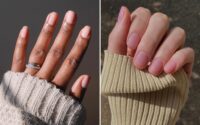Why men’s and women’s shirt buttons on different sides
Not all shirts are created equal.
People are just realizing that women’s shirt buttons are on the left side, while men’s are on the right — with many questioning these details.
“I *just* found out that shirt buttons are on the left for women and right for me. Wtf!!!!” one Twitter user exclaimed.
“I was today years old when I learned that women’s shirts have buttons on the left side!” wrote another.
So what gives? There are a few theories that date back ages.
One goes that wealthy women didn’t dress themselves — they had servants do it for them. Assuming that most people are right-handed, the buttons on women’s clothes were sewn so that someone else could fasten them.

“Why women’s shirts button from the left, while men’s button from the right: When buttons first appeared in the 17th century, they were only for the wealthy. Women were dressed by (right-handed) servants. Placing buttons on the left made it easier for them,” one author tweeted, along with a photo of a passage from “The Economic Naturalist: In Search of Explanations for Everyday Enigmas.”
In 2016, fashion historian Chloe Chapin informed the “Today” show about button placement.
“I think it’s important to question which time period we’re talking about, since shirt and jacket buttons are a relatively new phenomenon,” Chapin said. “But as a general rule, many elements of men’s fashion can be traced back to the military.”
Assuming most men were right-handed, putting buttons on the right side allowed better “access to a weapon,” which “practically trumped everything,” she explained, adding that a gun hidden in a shirt would be easier to grab with the dominant hand.

Another theory, Chapin offered, is that button placement distinguished women’s and men’s clothing at a time when that mattered. Women’s outfits became more “masculine” in the 1880s, but it was still “illegal” to be “dressed like a man in public.”
Other theories revolve around the need to breastfeed and care for a child. According to Southern Living, clothing-makers, again, assumed most women were right-handed and would be carrying infants in their left arm. If they needed to breastfeed, they could use their right hand to unbutton their shirts.
An Elle article noted an unconfirmed theory that Napoleon was offended that people would mock his hand-in-coat stance, ordering that women’s clothing be buttoned the opposite of men’s so they wouldn’t mimic him.
Or, of course, it could just be out-right gender inequality. The fact that women’s clothing buttoned opposite of men’s was a sign of inferiority, according to the 19th century sexologist Havelock Ellis.
The assumption at the time was that women were weaker and required more assistance, hence, the commonplace need for handmaids dressing them every day. By buttoning their clothing on the left, women would “seem inferior to men” in “strength and in rapidity and precision of movement.”


